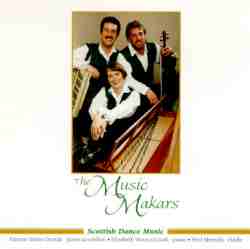
Etienne Weiss Ozorak: piano accordion
Elizabeth Weiss Ozorak: piano
Fred Mamula: fiddle
Scottish Dance Music
Etienne Weiss Ozorak: piano accordion
Elizabeth Weiss Ozorak: piano
Fred Mamula: fiddle
Program:
Music Makars
The Strathspey King
Susan's Jig Set
Sarona
Shetland Reel Set
Interlude: Medley of Bagpipe Tunes
Hoedown Reel Set
Argyll Strathspey
Follow Me Home
Waltz
Dancer's Auld Lang Syne and "Polka"
Total Time: 47:54
Released in 1995
label: The Music Makars
493 Arch Street
Meadville, PA 16335
USA
telephone: 814-337-0612
etozorak@alleg.edu
Review by Henry Doktorski:
When I first received "Music Makars" in the mail, my two children were in the living room. As soon as I turned on my stereo and inserted the disc into the CD player, we were pleasantly surprised by a delightful bath of radiant sound vibrations. Cheerful violin, accordion & piano music began pouring out of my speakers into the living room which caused my smiling three year old son to dance spontaneously.
The music was so joyful and my son's enthusiasm so infectious, that before one could say "Scottish Dance Music!" I began to dance with him, holding hands and jumping. After about two measures of music, (enough time to say "Etienne Ozorak" three times in rapid succession!) my seven year-old daughter unceremoniously burst into our circle and all three of us held hands and danced round and round, sometimes singing the melody and sometimes laughing, for the entire first track. When the first tune ended, we collapsed on the floor in a giggling heap to catch our breath.
But our rest was short-lived! After a few seconds of silence, track two began and we were up on our feet dancing again!
The Music Makars' album captures what you will hear at the dance hall: three great musicians performing great music from jigs and reels to ballads and waltzes. There are no gimmicks, no tricks, no fancy recording techniques; just authentic Scottish music.
Sometimes the accordion takes the lead, sometimes the fiddle, and sometimes both play in unison while the piano accompanies, keeping a steady beat. But all the time, the music strikes a chord in the heart of the listener, a chord that takes us back to a time when lives were simpler and less complicated; less frantic and less stressful.
While listening to this music, I closed my eyes and was instantly transported to a land of green rolling hills, rocky beaches, grazing sheep and goats, and a rustic barn with hewn plank floors with happy people stomping their feet and kicking up their heels with raucous laughter.
"Farewell to the Creeks," with its plaintive melody filled with longing, touches the heart and allows us to get in touch with part of ourselves normally hidden from view; a part which unfortunately is too often suffocated and suppressed by the society we happen to live in - a society enamored by technology and gadgets and fast food and MTV.
For listeners not familiar with traditional Scottish dance music, each song begins and ends with a chord which is a cue to the dancers to bow and curtsy to their partners.
I was surprised to see such traditional American fare as "Turkey in the Straw" and "Arkansas Traveler" (written in the late 1800's either in Pittsburgh or Ohio), but since both tunes appear in print in Kerr's Collection for the Violin, published in Glasgow (c. 1885), I imagine that now, 110 years later, they have become part of the standard dance repertoire in Scotland. Regarding "Turkey in the Straw," it is an americanization of an older Irish (or perhaps Scottish) tune called "The Old Bog Hole."
My biggest question is this: why is Elizabeth sitting at a harpsichord in the cover photo when, for the duration of the entire album, she only plays piano?
I salute the Music Makars for their contribution to the welfare of civilization and I recommend this album for all lovers of folk music.
| About The Free-Reed Review |
| Invitation to Contributors / Submission Guidelines |
| Back to The Free-Reed Review Contents
Page |
| Back
to The Classical Free-Reed, Inc. Home Page |